Fleurs du Mal Magazine


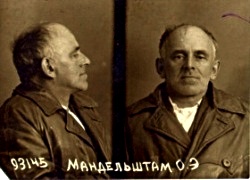
Osip Mandelstam
(1891-1938)
I detest the light…
I detest the light
Of tedious stars.
Hello, my old delirium,
The tower’s crenellated pinnacle!
Stone, turn to lace
Become a spider’s web,
With your thin needle, wound
The empty breast of the sky.
My own turn will come,
I feel the stretching of my wings.
But where will the arrow
Of living thought fly?
Perhaps having used up my path,
And my time, I will come back:
– There I could not love,
– Here I fear to love . . .
1912

Osip Mandelstam poetry
Transl. J.A. Woolf
fleursdumal.nl magazine
More in: Archive M-N, J.A. Woolf, Mandelstam, Osip, REPRESSION OF WRITERS, JOURNALISTS & ARTISTS, Woolf, J.A.
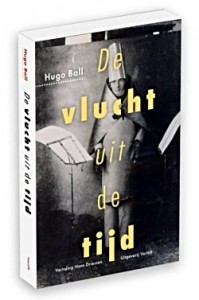 De vlucht uit de tijd
De vlucht uit de tijd
Hugo Ball
Vertaald door Hans Driessen
Het korte leven van Hugo Ball werd gekenmerkt door rusteloosheid. Deze rusteloosheid is goed zichtbaar in Balls hoofdwerk Die Flucht aus der Zeit (1927) – bijna letterlijk zijn laatste, radicale woorden. Hij wilde geen concessies meer doen aan het lezend publiek en aan de waarheid mocht niet worden geschaafd. De romanvorm schoot daarom in zijn ogen tekort: De vlucht uit de tijd werd een compilatie uit zijn dagboeken, een bonte verzameling van notities, redeneringen, uittreksels en citaten uit boeken die voor Hugo Ball belangrijk waren. Er zijn twee duidelijke zwaarte-punten: de oprichting van de dada-beweging, met alles wat daaraan voorafging en wat erop volgde, en Balls terugkeer naar de katholieke kerk, die zijn dada-kameraden hogelijk verbaasde, om niet te zeggen ergerde. De lezer wordt in De vlucht uit de tijd een blik gegund in de werkplaats van deze onnavolgbare denker, die zijn teksten presenteert zoals hij ze destijds noteerde: rechtstreeks en zonder opsmuk.
352 pagina’s | paperback
isbn 978 94 6004 265 2
prijs 22,50
Uitgeverij Vantilt
St. Annastraat 99
6501 bk Nijmegen 652 4 ek Nijmegen
e-mail: info@vantilt.nl
www.vantilt.nl
fleursdumal.nl magazine
More in: - Book News, Ball, Hugo, Dada
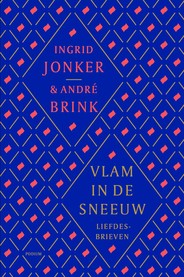 Ingrid Jonker – André Brink
Ingrid Jonker – André Brink
Vlam in de sneeuw
Van de jonggestorven, iconische dichter Ingrid Jonker is bekend dat ze mannen het hoofd op hol wist te brengen. Een van hen was de onlangs gestorven schrijver André Brink. Tot kort voor Ingrids zelfgekozen dood, op haar eenendertigste, was hij haar vurige minnaar. Op geografische afstand, wat voor de literatuurgeschiedenis nu een zegen blijkt. Want het noodde hen tot een jarenlange, ongekend intense liefdescorrespondentie. Vlam in de sneeuw biedt allereerst een intieme blik op de jonge levens van twee veelbelovende schrijvers die, nog zoekende naar hun plek in de wereld, tot over hun oren verliefd op elkaar worden. Maar ze delen niet alleen hun liefde voor elkaar, ook delen ze hun twijfels over hun schrijverschap en hun diepste overtuigingen over geloof, literatuur en politiek. Het is met grote trots dat wij deze tot vurige woorden gestolde passie, kort na verschijning in Zuid-Afrika, nu voor de Nederlandse lezer mogen ontsluiten.
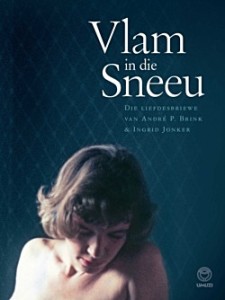
512 pagina’s
omslag: Studio Ron van Roon
ISBN: 978 90 5759 775 6
Nur: 320
originele titel: Vlam in die sneeu
vertaler: Karina van Santen, Rob van der Veer en Martine Vosmaer
€ 34,90
uitgeverij Podium
fleursdumal.nl magazine
More in: # Archive S.A. literature, - Book News, André Brink, Archive A-B, Archive I-J, Ingrid Jonker, Ingrid Jonker
 Met zijn eerste worp wist Azurri al direct een flink stuk van het land van Céleste te winnen. Maar bij zijn tweede worp leek hij te overmoedig. Het mes sloeg in buiten de landen. De cafémeid greep het mes en mikte nauwkeurig. En waar niemand op rekende, lukte haar. Met de volgende worpen drong ze steeds dieper in het land van Azurri door, tot ze zoveel veroverd had dat er geen plaats meer voor zijn koning was. Met de punt van het mes mikte ze de koning het land uit, veegde het lemmet schoon en knipte het mes dicht. Azurri was woedend. Voor hem bestond er geen grotere schande dan te verliezen van een vrouw. Hij wilde haar het mes uit de hand rukken. De omstanders hielden hem echter tegen. Céleste liep terug naar de meidoorn, waar Kaffa en Angela nog steeds waren. Josanna liep met haar mee. Werktuiglijk streelde Céleste het kind, voelde haar warme gezicht. Voor het eerst begreep ze iets van de weerbarstigheid van de kleine heks.
Met zijn eerste worp wist Azurri al direct een flink stuk van het land van Céleste te winnen. Maar bij zijn tweede worp leek hij te overmoedig. Het mes sloeg in buiten de landen. De cafémeid greep het mes en mikte nauwkeurig. En waar niemand op rekende, lukte haar. Met de volgende worpen drong ze steeds dieper in het land van Azurri door, tot ze zoveel veroverd had dat er geen plaats meer voor zijn koning was. Met de punt van het mes mikte ze de koning het land uit, veegde het lemmet schoon en knipte het mes dicht. Azurri was woedend. Voor hem bestond er geen grotere schande dan te verliezen van een vrouw. Hij wilde haar het mes uit de hand rukken. De omstanders hielden hem echter tegen. Céleste liep terug naar de meidoorn, waar Kaffa en Angela nog steeds waren. Josanna liep met haar mee. Werktuiglijk streelde Céleste het kind, voelde haar warme gezicht. Voor het eerst begreep ze iets van de weerbarstigheid van de kleine heks.
Week was het kind nu, terwijl het nog steeds de dode vogel droeg. Céleste begreep dat het meisje meer aandacht nodig had. Ze zou voortaan wat meer tijd aan haar moeten besteden. Met zachte stem praatte de kleine heks. Ze vertelde dat ze de volgende dag de vogel zou begraven. Ze moest toch echt van het dier gehouden hebben, ook al had niemand er ooit iets van gemerkt. Céleste voelde zich triest. Overdonderd door deze dag, die haar altijd bij zou blijven. Een afschuwelijke, boze droom. De dag waarop ze de jongen had moeten achterlaten. Het kind dat nu van iedereen verlaten in de kerk verbleef, tussen dode heiligen en een slapende God. Ze dacht aan Elysee, die meer wist over haar dan hij zei. In de schuur van Chile had hij haar daarmee op stang gejaagd. Misschien durfde hij haar niet te vertellen over al die ellende waar hij van wist. Ze zag hoe Kaffa tegen de meidoorn zat, zijn gezicht naar de lucht en met open ogen. De haren hingen verward rond zijn kop. Hij had de dekenzak uit de meidoorn gehaald en drukte hem krachtig tegen zijn buik. Angela stond naast hem. Paniekerig. Ze wist niet wat te doen.
Céleste liep naar Kaffa toe, bukte zich over hem heen en streelde zijn gezicht. `Kom’, zei ze zacht en ze trok hem overeind. Ze voelde dat zijn handen vanbinnen zacht waren. Zonder eelt, als de handen van een kind. Kaffa sloeg de dekenzak over zijn schouder. Ze begreep dat hij wegging. Hij kon niet langer in Solde blijven. De koning had het spel verloren. Hij had zijn land aan het dorp verspeeld. Hij zou er nooit meer tot rust kunnen komen. In Solde was geen plaats voor een onttroonde koning. `Hier is je mes’, zei Céleste. Hij stak het bij zich. Hand in hand liepen ze het donker in. De meisjes Azurri bleven alleen achter onder de meidoorn. Hun moeder stond voor de deur van haar huis. De mond open. Sprakeloos. Haar hoofd vol woelende gedachten over haar dromen, waar ze maar geen wijs uit kon worden. De hond, die niet alleen wilde blijven, schoot blaffend het café uit en rende Céleste achterna. In het dorp kon men hem nog lang horen. Steeds verder weg. Schijnbaar keerde de rust terug in het dorp. De geluiden van het land kregen de overhand. Konijnen die, aangetrokken door de nalatende gloed van de loofvuren, erin gesprongen waren, vlam hadden gevat en levend verbrandden. Vonkend rolden ze door het zand en ze gilden als kinderen.
EINDE
Ton van Reen: Landverbeuren (74)
fleursdumal.nl magazine
More in: - Landverbeuren, Reen, Ton van
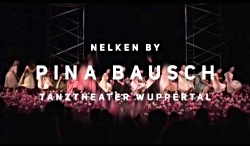 Holland Festival 2016
Holland Festival 2016
Nelken
Tanztheater Wuppertal Pina Bausch
16 t/m 19 juni 2016
Stadsschouwburg Amsterdam
Een van haar mooiste werken wordt het genoemd. In 1982 maakte Pina Bausch Nelken en sindsdien is het nooit meer van het repertoire verdwenen. Na vijf jaar is het Tanztheater Wuppertal van Bausch, die in 2009 overleed, terug in Nederland met deze tijdloze klassieker uit haar oeuvre. Nelken is een universum op zichzelf. Befaamd is het prachtige toneelbeeld van Bausch’ vaste scenograaf Peter Pabst: duizenden anjers die uit het toneel omhoog lijken te groeien. Wie het ooit zag, is het beeld nooit meer vergeten. Daartussendoor banen de dansers zich een weg over het podium: Bausch’ eeuwige slagveld van de liefde.
Het gezelschap Tanztheater Wuppertal, opgericht door dansvernieuwer Pina Bausch (1940 – 2009), keert terug naar het Holland Festival met een reprise van Nelken (1982). Het stuk belichaamt Bausch’ interpretatie van het land Arcadië uit de klassieke oudheid: een mythologisch paradijs van vóór het begin van de menselijke geschiedschrijving, waar altijd bloemen bloeien en de zon schijnt. Een droomland, dat ook onherroepelijk verloren is gegaan.
In haar leven en carrière kreeg choreografe en danser Philippine Bausch (1940-2009), beter bekend onder haar bijnaam Pina, een legendarische status als radicale dansvernieuwer. Vanaf 1973 tot aan haar dood zwaaide ze de scepter bij het Tanztheater Wuppertal, en ontwikkelde daar een unieke toonaangevende stijl.
‘Nelken has lost none of its power’ – The Guardian
HOLLAND FESTIVAL
Stadsschouwburg Amsterdam
Leidseplein 26
1017 PT Amsterdam
t. (0)20 – 523 77 87
# Meer info op website Holland Festival
fleursdumal.nl magazine
More in: Art & Literature News, Holland Festival, Pina Bausch, THEATRE
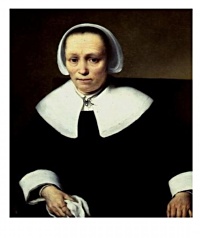
Anne Bradstreet
(1612-1672)
By Night When Others Soundly Slept
By night when others soundly slept
And hath at once both ease and Rest,
My waking eyes were open kept
And so to lie I found it best.
I sought him whom my Soul did Love,
With tears I sought him earnestly.
He bow’d his ear down from Above.
In vain I did not seek or cry.
My hungry Soul he fill’d with Good;
He in his Bottle put my tears,
My smarting wounds washt in his blood,
And banisht thence my Doubts and fears.
What to my Saviour shall I give
Who freely hath done this for me?
I’ll serve him here whilst I shall live
And Loue him to Eternity
Anne Bradstreet poetry
fleursdumal.nl magazine
More in: Archive A-B, Bradstreet, Anne
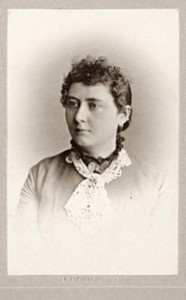
Isabella Valancy Crawford
(1850-1887)
The Ghosts Of The Trees
The silver fangs of the mighty axe,
Bit to the blood of our giant boles;
It smote our breasts and smote our backs,
Thunder’d the front-cleared leaves–
As sped in fire,
The whirl and flame of scarlet leaves
With strong desire
Leaped to the air our captive souls.
While down our corpses thunder’d,
The air at our strong souls gazed and wondered
And cried to us, ‘Ye
Are full of all mystery to me!
I saw but thy plumes of leaves,
Thy strong, brown greaves;
The sinewy roots and lusty branches,
And fond and anxious,
I laid my ear and my restless breast
By each pride-high crest;
And softly stole
And listen’d by limb and listen’d by bole,
Nor ever the stir of a soul,
Heard I in ye–
Great is the mystery!’
The strong, brown eagle plung’d from his peak,
From the hollow iron of his beak;
The wood pigeon fell; its breast of blue
Cold with sharp death all thro’ and thro’,
To our ghosts he cried.
‘With talons of steel,
I hold the storm;
Where the high peaks reel,
My young lie warm.
In the wind-rock’d spaces of air I bide;
My wings too wide–
Too angry-strong for the emerald gyves,
Of woodland cell where the meek dove thrives.
And when at the bar,
Of morn I smote with my breast its star,
And under–
My wings grew purple, the jealous thunder,
With the flame of the skies
Hot in my breast, and red in my eyes;
From peak to peak of sunrise pil’d
That set space glowing,
With flames from air-based crater’s blowing–
I downward swept, beguiled
By the close-set forest gilded and spread
A sea for the lordly tread,
Of a God’s wardship–
I broke its leafy turf with my breast;
My iron lip
I dipp’d in the cool of each whispering crest;
From thy leafy steeps,
I saw in my deeps,
Red coral the flame necked oriole–
But never the stir of a soul
Heard I in ye–
Great is the mystery!’
From its ferny coasts,
The river gazed at our strong, free ghosts,
And with rocky fingers shed
Apart the silver curls of its head;
Laid its murmuring hands,
On the reedy bands;
And at gaze
Stood in the half-moon’s of brown, still bays;
Like gloss’d eyes of stags
Its round pools gaz’d from the rusty flags,
At our ghostly crests
At the bark-shields strong on our phantom breasts;
And its tide
Took lip and tongue and cried.
‘I have push’d apart
The mountain’s heart;
I have trod the valley down;
With strong hands curled,
Have caught and hurled,
To the earth the high hill’s crown!
My brow I thrust,
Through sultry dust,
That the lean wolf howl’d upon;
I drove my tides,
Between the sides,
Of the bellowing canon.
From chrystal shoulders,
I hurled my boulders,
On the bridge’s iron span.
When I rear’d my head
From its old time bed,
Shook the pale cities of man!
I have run a course
With the swift, wild horse;
I have thunder’d pace for pace,
With the rushing herds–
I have caught the beards
Of the swift stars in the race!
Neither moon nor sun
Could me out-run;
Deep cag’d in my silver bars,
I hurried with me,
To the shouting sea,
Their light and the light of the stars!
The reeling earth
In furious mirth
With sledges of ice I smote.
I whirled my sword
Where the pale berg roar’d,
I took the ship by the throat!
With stagnant breath
I called chill Death
My guest to the hot bayou.
I built men’s graves,
With strong thew’d waves
That thing that my strength might do.
I did right well–
Men cried ‘From Hell
The might of Thy hand is given!’
By loose rocks stoned
The stout quays groaned,
Sleek sands by my spear were riven.
O’er shining slides,
On my gloss’d tides,
The brown cribs close woven roll’d;
The stout logs sprung,
Their height among
My loud whirls of white and gold!
The great raft prest,
My calm, broad breast–
A dream thro’ my shady trance,
The light canoe–
A spirit flew–
The pulse of my blue expanse.
Wing’d swift the ships.
My foaming lips
Made rich with dewy kisses,
All night and morn,
Field’s red with corn,
And where the mill-wheel hisses.
And shivers and sobs,
With lab’ring throbs,
With its whirls my strong palms play’d.
I parted my flags,
For thirsty stags,
On the necks of arches laid.
To the dry-vined town
My tide roll’d down–
Dry lips and throats a-quiver,
Rent sky and sod
With shouts ‘From God
The strength of the mighty river!’
I, list’ning, heard
The soft-song’d bird;
The beetle about thy boles.
The calling breeze,
In thy crests, O Trees–
Never the voices of souls!’
* * * * *
We, freed souls, of the Trees look’d down
On the river’s shining eyes of brown;
And upward smiled
At the tender air and its warrior child,
The iron eagle strong and wild.
* * * * *
‘No will of ours,
The captive souls of our barky tow’rs;
‘His the deed
Who laid in the secret earth the seed;
And with strong hand
Knitted each woody fetter and band.
Never, ye
Ask of the tree,
The ‘Wherefore’ or ‘Why’ the tall trees stand,
Built in their places on the land
Their souls unknit;
With any wisdom or any wit,
The subtle ‘Why,’
Ask ye not of earth or sky–
But one command it.
Isabella Valancy Crawford poetry
fleursdumal.nl magazine
More in: Archive C-D, CLASSIC POETRY
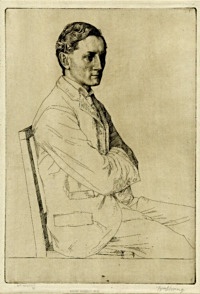
Sir Henry Newbolt
(1862-1938)
Ionicus
With failing feet and shoulders bowed
Beneath the weight of happier days,
He lagged among the heedless crowd,
Or crept along suburban ways.
But still through all his heart was young,
A courage, a pride, a rapture, sprung
Of the strength and splendour of England’s war.
From ill-requited toil he turned
To ride with Picton and with Pack,
Among his grammars inly burned
To storm the Afghan mountain-track.
When midnight chimed, before Quebec
He watched with Wolfe till he morning star;
At noon he saw from Victory’s deck
The sweep and splendour of England’s war.
Beyond the book his teaching sped,
He left on whom he taught the trace
Of kinship with the deathless dead,
And faith in all the Island race.
He passed : his life a tangle seemed,
His age from fame and power was far;
But his heart was night to the end, and dreamed
Of the sound and splendour of England’s war.
Sir Henry Newbolt poetry
fleursdumal.nl magazine
More in: Archive M-N, CLASSIC POETRY
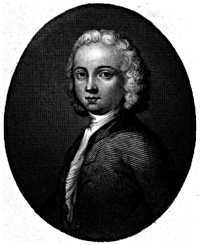
William Collins
(1721 – 1759)
Ode On The Poetical Character
As once, if not with light regard,
I read aright that gifted bard,
(Him whose school above the rest
His loveliest Elfin Queen has blest,)
One, only one, unrival’d fair,
Might hope the magic girdle wear,
At solemn tourney hung on high,
The wish of each love-darting eye;
Lo! to each other nymph in turn applied,
As if, in air unseen, some hov’ring hand,
Some chaste and angel-friend to virgin-fame,
With whisper’d spell had burst the starting band,
It left unblest her loath’d dishonour’d side;
Happier, hopeless fair, if never
Her baffled hand with vain endeavour
Had touch’d that fatal zone to her denied!
Young Fancy thus, to me divinest name,
To whom, prepar’d and bath’d in Heav’n,
The cest of amplest pow’r is giv’n:
To few the god-like gift assigns,
To gird their blest prophetic loins,
And gaze her visions wild, and feel unmix’d her flame!
The band, as fairy legends say,
Was wove on that creating day,
When He, who call’d with thought to birth
Yon tented sky, this laughing earth,
And dress’d with springs, and forests tall,
And pour’d the main engirting all,
Long by the lov’d enthusiast woo’d,
Himself in some diviner mood,
Retiring, sate with her alone,
And plac’d her on his sapphire throne,
The whiles, the vaulted shrine around,
Seraphic wires were heard to sound,
Now sublimest triumph swelling,
Now on love and mercy dwelling;
And she, from out the veiling cloud,
Breath’d her magic notes aloud:
And thou, thou rich-hair’d youth of morn,
And all thy subject life was born!
The dang’rous Passions kept aloof,
Far from the sainted growing woof:
But near it sate ecstatic Wonder
List’ning the deep applauding thunder:
And Truth, in sunny vest array’d,
By whose the tarsel’s eyes were made
All the shad’wy tribes of mind,
In braided dance their murmurs join’d,
And all the bright uncounted Pow’rs
Who feed on Heav’n’s ambrosial flow’rs.
Where is the bard, whose soul can now
Its high presuming hopes avow?
Where he who thinks, with rapture blind,
This hallow’d work for him design’d?
High on some cliff, to Heav’n up-pil’d,
Of rude access, of prospect wild,
Where, tangled round the jealous steep,
Strange shades o’erbrow the valleys deep,
And holy genii guard the rock,
Its glooms embrown, its springs unlock,
While on its rich ambitious head,
An Eden, like his own, lies spread.
I view that oak, the fancied glades among,
By which as Milton lay, his ev’ning ear,
From many a cloud that dropp’d ethereal dew,
Nigh spher’d in Heav’n its native strains could hear:
On which that ancient trump he reach’d was hung;
Thither oft his glory greeting,
From Waller’s myrtle shades retreating,
With many a vow from Hope’s aspiring tongue,
My trembling feet his guiding steps pursue;
In vain—such bliss to one alone,
Of all the sons of soul was known,
And Heav’n, and Fancy, kindred pow’rs,
Have now o’erturn’d th’ inspiring bow’rs,
Or curtain’d close such scene from ev’ry future view.
William Collins poetry
fleursdumal.nl magazine
More in: Archive C-D, CLASSIC POETRY
Thank you for reading Fleurs du Mal - magazine for art & literature